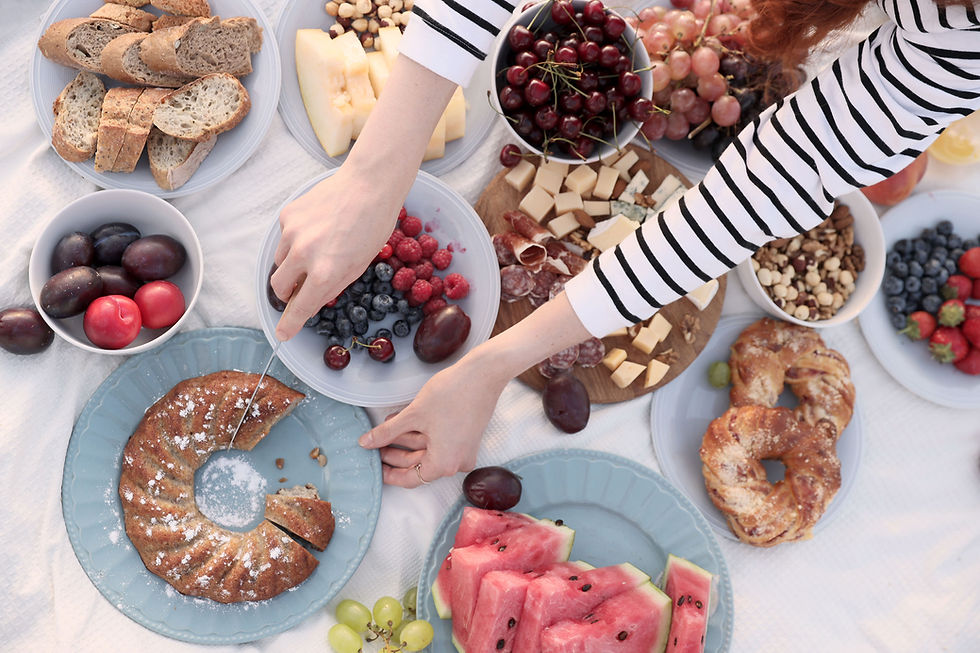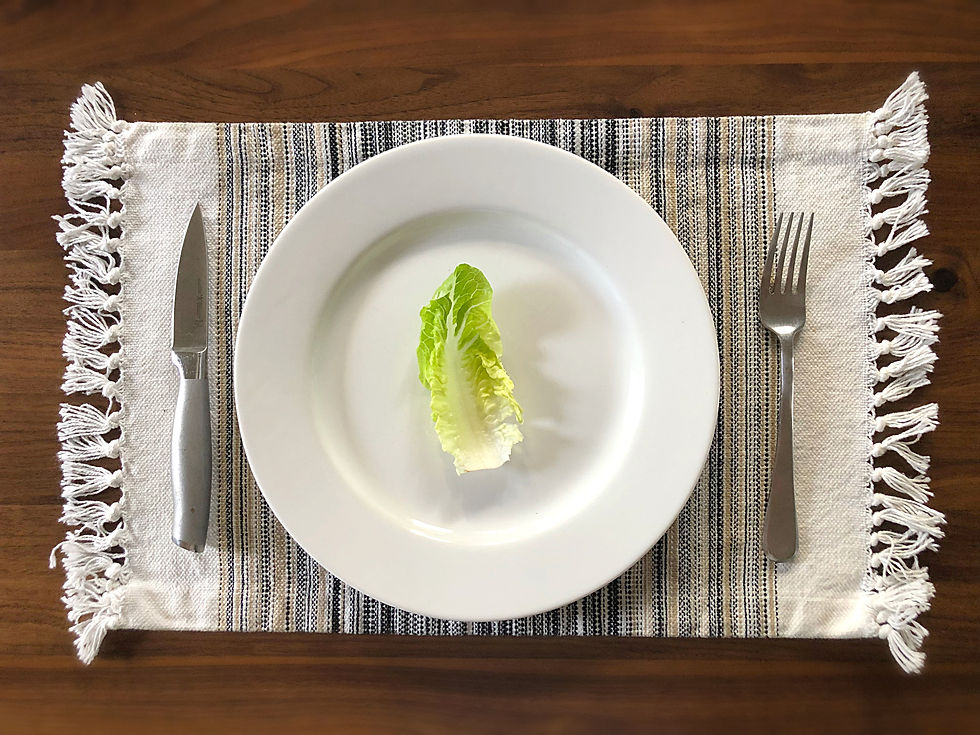Making Peace With Food
- naturallynatalierdn

- Mar 29, 2022
- 6 min read
Updated: Dec 12, 2023
Written by: Natalie Faella, MS, RDN, LDN | March 29, 2022

Part of intuitive eating is giving yourself unconditional permission to eat. This not only includes honoring your hunger, but also making peace with food. This means dropping all of your food rules at the door.
Most of us are not even aware that we have food rules; they have either been ingrained in us for so long that we no longer question them, or we truly don’t recognize them because we’ve just accepted them as facts and things we "should" do. In order to make peace with food, we first have to identify what our food rules are.
Food rules can look like things such as:
Having to order a salad at lunch/dinner (and not even looking at the sandwiches, pasta dishes, or other things on the menu)
Always opting for the "healthier" substitutes, like low-carb bread products, low-fat dressings, powdered peanut butters, etc. instead of the regular options
Measuring and eating only 1 serving of pasta, rice, chips, peanut butter, etc. at meal/snack time
Not allowing yourself to eat bread more than once per day, or avoiding it altogether (bun-less burgers, lettuce wrap sandwiches, etc.)
Keeping sweets out of the house to avoid eating them
Opting for either wine, the breadbasket, or dessert when out to dinner — but definitely not all three
Bringing your own food to parties or catered events to avoid eating what’s served there
You might be thinking "aren’t these healthy/good habits?" which makes sense, because that is exactly what diet culture tells us. It teaches us that we should have food rules to keep us "healthy" and "safe" from overeating, giving in to cravings, and feeling guilty. But what diet culture gets wrong is that these rules increase our preoccupation with food, and thinking about food all of the time (especially the ones we "can’t" have) is exactly what leads us to overeat, give in to our cravings, and feel guilty. (It's called a scarcity mindset, where we focus on what we feel is lacking or unavailable in our lives so much so that it becomes all we can think about). So they don't keep us safe, and being preoccupied with food actually isn’t healthy at all.
We’ve all been there. Whether it’s as seemingly innocent as "I’m going to be 'good' during the week and enjoy the weekends." You had your hardboiled egg breakfasts, bland salad lunches, carb-less dinners, and no wine or desserts all week and the next thing you know, it’s Sunday night and you’re hungover polishing off a large pizza while vowing to "be good" again starting tomorrow. Or you tell yourself "no more sweets" and a week later you’re wrist-deep in the office bowl of M&Ms during that after-lunch slump.
There is absolutely nothing to be ashamed of if any of this resonates with you. I have 100% been there — literally, with the pizza, and in deep with the M&Ms, too. It is normal and unavoidable as it is the body's biological response to deprivation.
But knowing this information may not be enough to make us ditch our food rules. Rules give us order, structure, and a sense of security or safety. So it is OK if the thought of dumping all of your food rules at once sounds scary.
Let's look at a couple of common worries this brings up:
If I ditch my food rules, what if I just keep eating the bad stuff?
This is a common fear and it is the exact reason why we make food rules in the first place—we try to prevent eating (or eating too much of) the "bad" stuff. Yes, if you’ve been restricting certain foods and then allow yourself to start eating them, you’re likely to overindulge at first. Especially if you’ve been restricting these foods for a while. This is what happens after we’ve been deprived, remember?
But there is this little thing called habituation that comes into play and helps ensure this will be short-term. Habituation is when our physical and emotional response to a stimulus decreases after we’ve been exposed to the stimulus over and over again. For example, say pasta is one of the forbidden foods you’re trying to make peace with. You’re so excited to eat it again, that you make it every night for dinner. The first night you’re ecstatic—loving every single bite. The next night you’re still excited about it, but by the 4th, 5th, or 6th night, how do you think you’re going to feel about it? Maybe over it or wanting something else to eat?
An abundance mindset also plays a role in why you wouldn’t continue only eating your forbidden foods. By giving yourself full permission to eat all foods, even your "forbidden ones" actually diminishes the allure and cravings for them. Eventually, pasta just becomes another option for dinner, not one you can only have if you've "been good all week" or if you exercised that day. And by pasta becoming just another normal food in your diet, it's not going to hold any power over you—you'll be able to eat it when you want without fear of overdoing it or how it will affect your weight/shape. It won't be this thing lurking in your pantry for when you want to "cheat" or constantly tempting you to overeat. An abundance mindset has the opposite effect of a scarcity mindset.
What if I overeat?
Another common fear, especially for those who have felt the pressure to diligently measure serving sizes of foods like peanut butter, nuts, chips, ice cream, pasta—you know, all the one's diet culture tells us we should in fear of taking in too many calories.
Habituation helps here, too. Of course, there is likely to be those times of really going all in on forbidden foods and probably eating past comfortable fullness when first giving ourselves permission (biology, remember?). But as we start to eat more intuitively and mindfully, we can actually notice how foods lose their allure while we're eating them.
Have you ever noticed that the first bite of ice cream tastes reeeally good? So does the second, third... but as you keep eating, it gets a little less excitingly good? This is because both physiological (taste, hunger) and behavioral (craving, brain/neurotransmitter excitement) responses to food begin to decrease with increased exposure, especially as we get to a point of satiety.
Besides tuning in and noticing when we're satisfied, there is another way we may prevent overeating: giving ourselves unconditional permission to eat (yes, the abundance mindset again). When we buy the forbidden ice cream, we can say to ourselves: "I have the permission to eat this—however much I want, whenever I want." Believe it or not, this works MUCH better to prevent overeating than when we buy the ice cream and say: "I'm only going to have 1 scoop, after dinner on the weekends." Then we end up thinking about the ice cream all week and polishing off the carton on Friday night.
But what if I never want any “healthy” foods?
Another common fear as we can often feel like we "should" eat foods like vegetables, fruits, whole grains, etc. But if there are any foods you are forcing yourself to eat, and truly do not like but are doing it for "health" sake, you probably shouldn’t be eating those foods anyway. Remember how satisfaction is important in eating?
If you’re giving yourself permission to eat all foods, and naturally enjoy a variety of foods, there is a very good chance you will naturally eat a balance of all food groups. Remember that we’re born with the ability to eat intuitively and naturally select foods that meet our body's needs. This is the state we’re trying to return to — trusting our body's abilities to do that.
Picture it like this: you go on vacation to Mexico and really lean into the chips, guac, and poolside margaritas. (Why wouldn't you?!). The breakfast and dinner tacos also happen to be excellent, and you’re really loving not having to cook and just simply enjoying yourself. After a week of this, it’s time to go home. Are you picking up taco ingredients and tequila at the supermarket or are you feeling ready for your typical go-to meals and rehydration?
As lovely as margaritas and taco Tuesday every day sounds, I'm willing to bet it's the latter.
Our bodies know what's best for us, but somewhere along the line, we were told that they don't and that we need to take over and try to control our weight and food intake. My goal is to help you get back in tune.
Keep following along for more on how to get back to this place of body trust and intuitive eating. Part 2 and more of the "how to's" of making peace with food is coming next week!
Stay tuned for future blogs, newsletters, and nutrition & intuitive eating updates, by subscribing here.
Sources:



Comments